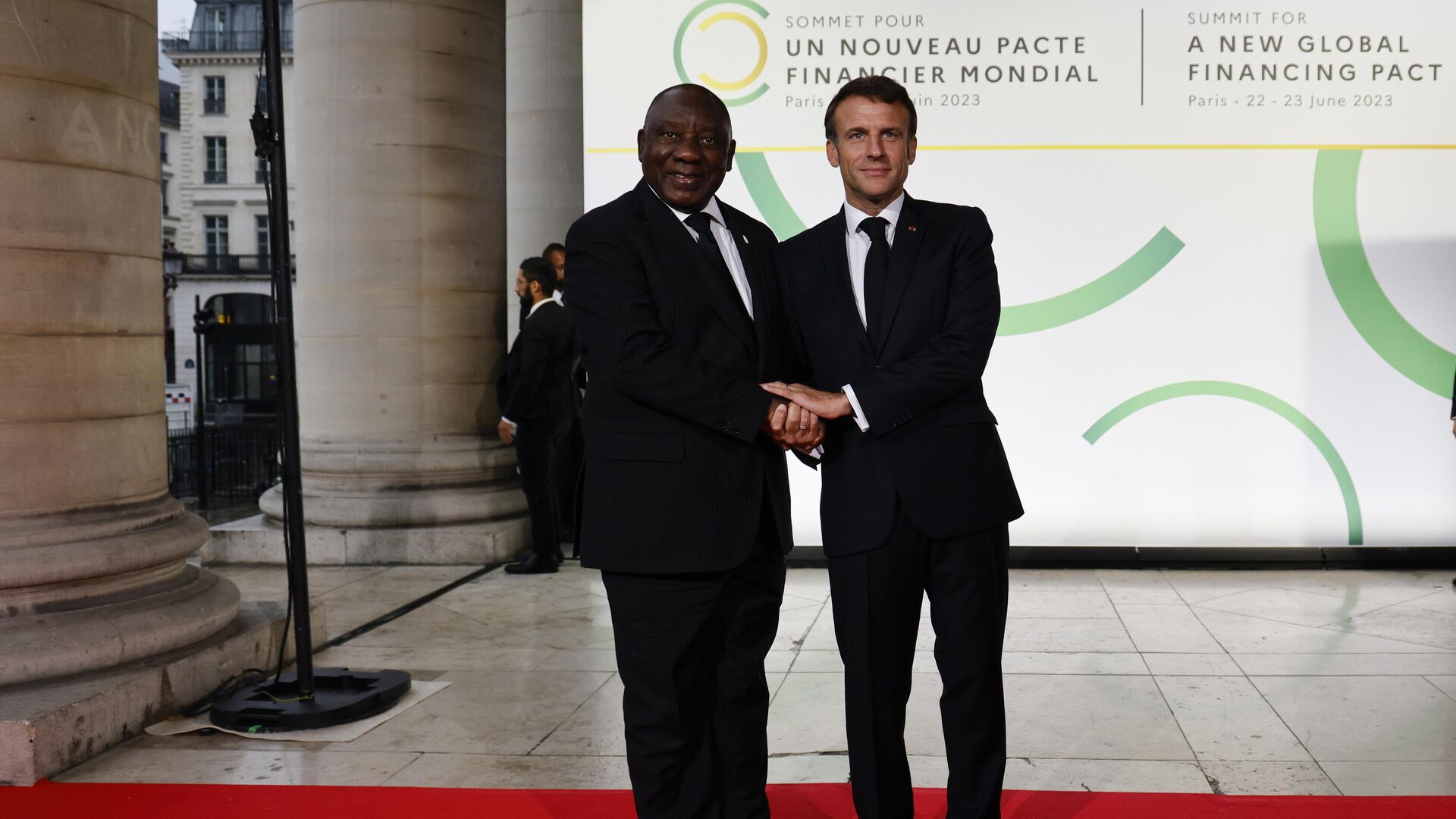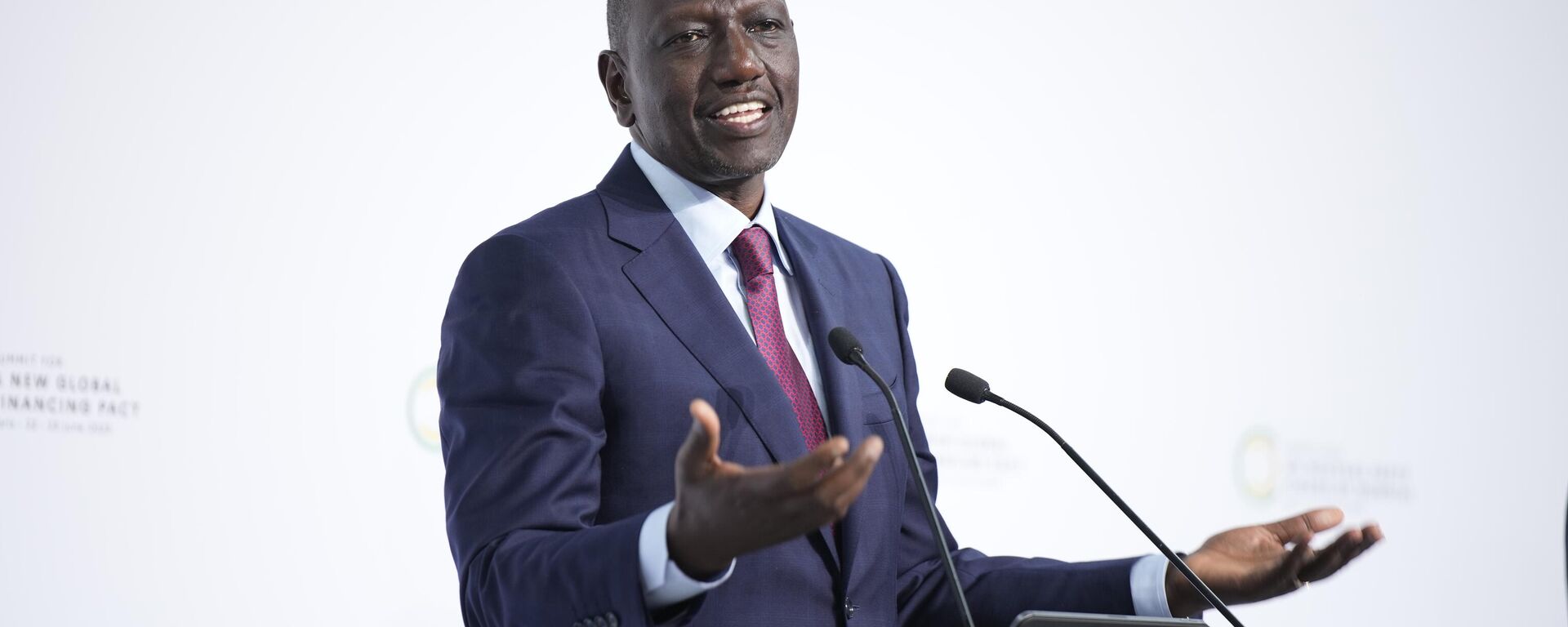https://en.sputniknews.africa/20230626/africans-dont-want-to-be-treated-like-beggars-ramaphosa-insists-on-imf-reform-1060176371.html
Africans 'Don't Want to Be Treated Like Beggars': Ramaphosa Insists on IMF Reform
Africans 'Don't Want to Be Treated Like Beggars': Ramaphosa Insists on IMF Reform
Sputnik Africa
African leaders have repeatedly expressed their frustration over the global financial architecture that neglects the needs of developing countries. In... 26.06.2023, Sputnik Africa
2023-06-26T19:42+0200
2023-06-26T19:42+0200
2023-06-26T19:43+0200
sub-saharan africa
south africa
southern africa
cyril ramaphosa
international monetary fund (imf)
world bank
william ruto
climate
climate change
finance
https://cdn1.img.sputniknews.africa/img/07e7/06/1a/1060176228_0:0:3072:1728_1920x0_80_0_0_5a60fd67de5d5679711b34eb20b0dd81.jpg
Countries of the Global South no longer want to be treated as beggars by international financial institutions, including the IMF and World Bank, said South African President Cyril Ramaphosa while calling for reforms to these organizations. Commenting on the two-day summit on financing development and climate action held in Paris last week, the president highlighted that developing countries don't ask for handouts. He reiterated that poor nations contributed the least to the climate change, however, they are most vulnerable to the effects of global warming. Ramaphosa recalled that "wealthier countries" spent years developing their economies and carrying out activities that eventually caused the climate damage. And now they are urging developing nations to limit this kind of activity. Instead, he said, they should foot the bill by funding climate actions in the countries of the Global South. He particularly insisted that industrialized countries have to meet their existing commitments, referring to their promise to mobilize $100 billion a year to support climate action in developing states.The South African leader stated that the International Monetary Fund (IMF) and World Bank must be subjected to a "fundamental overhaul" to take into account the interests of developing states. He noted that the organizations should become "more inclusive and responsive" in order to succeed in their mission of supporting global development. The South African president further elaborated that the IMF and World Bank should provide financing in a way that does not increase the debt burden of some countries. The conditions set by the IMF for the granting of loans have indeed caused debates in several African states. Earlier this year, Tunisia rejected a $1.9 billion bailout loan from the IMF. Tunisian President Kais Saied underlined that he would not accept "diktats," noting that the prescriptions of the IMF could even "undermine the civil peace." He recalled deadly riots that erupted in the North African nation in 1983 after the government raised the price of bread, adding: "Public peace is not a game."
https://en.sputniknews.africa/20230623/dont-want-to-look-for-help-kenyas-ruto-lambasts-global-lending-system-calls-for-equality-1060109561.html
south africa
southern africa
Sputnik Africa
feedback@sputniknews.com
+74956456601
MIA „Rossiya Segodnya“
2023
Sputnik Africa
feedback@sputniknews.com
+74956456601
MIA „Rossiya Segodnya“
News
en_EN
Sputnik Africa
feedback@sputniknews.com
+74956456601
MIA „Rossiya Segodnya“
Sputnik Africa
feedback@sputniknews.com
+74956456601
MIA „Rossiya Segodnya“
south africa, southern africa, cyril ramaphosa, international monetary fund (imf), world bank, william ruto, climate, climate change, finance
south africa, southern africa, cyril ramaphosa, international monetary fund (imf), world bank, william ruto, climate, climate change, finance
Africans 'Don't Want to Be Treated Like Beggars': Ramaphosa Insists on IMF Reform
19:42 26.06.2023 (Updated: 19:43 26.06.2023) African leaders have repeatedly expressed their frustration over the global financial architecture that neglects the needs of developing countries. In particular, Kenyan President William Ruto recently called the global lending system unequal and punitive as it divides nations into rich ones and those who are supposed to "look for help."
Countries of the Global South no longer want to be treated as beggars by international financial institutions, including the IMF and World Bank, said South African President Cyril Ramaphosa while calling for reforms to these organizations.
Commenting on the two-day summit on financing development and climate action held in Paris last week, the president highlighted that developing countries don't ask for handouts. He reiterated that poor nations contributed the least to the climate change, however, they are most vulnerable to the
effects of global warming.
"We do not want to be treated like beggars, as if we are asking for charity. The industrialization and economic development of the Global North was achieved at the expense of the Global South," he stressed, adding: "Wealthier countries, therefore, have both an obligation and an interest in supporting development and climate action in poorer countries."
Ramaphosa recalled that "wealthier countries" spent years developing their economies and carrying out activities that eventually caused the climate damage. And now they are urging developing nations to limit this kind of activity. Instead, he said, they should foot the bill by funding climate actions in the countries of the Global South.
He particularly insisted that industrialized countries have to meet their existing commitments, referring to their promise to mobilize $100 billion a year to support
climate action in developing states.
The South African leader stated that the International Monetary Fund (IMF) and World Bank must be subjected to a "fundamental overhaul" to take into account the interests of developing states. He noted that the organizations should become "more inclusive and responsive" in order to succeed in their mission of supporting global development.
"These bodies should be restructured to be more inclusive and responsive. They should provide funding in a way that does not increase the debt burden of countries that are already struggling to service their debt," Ramaphosa said.
The South African president further elaborated that the IMF and World Bank should provide financing in a way that does not increase the
debt burden of some countries. The conditions set by the IMF for the granting of loans have indeed caused debates in several African states.
Earlier this year, Tunisia rejected a $1.9 billion bailout loan from the IMF. Tunisian President Kais Saied underlined that he would not accept "diktats," noting that the prescriptions of the IMF could even "undermine the civil peace." He recalled deadly riots that erupted in the North African nation in 1983 after the government raised the price of bread, adding: "Public peace is not a game."


